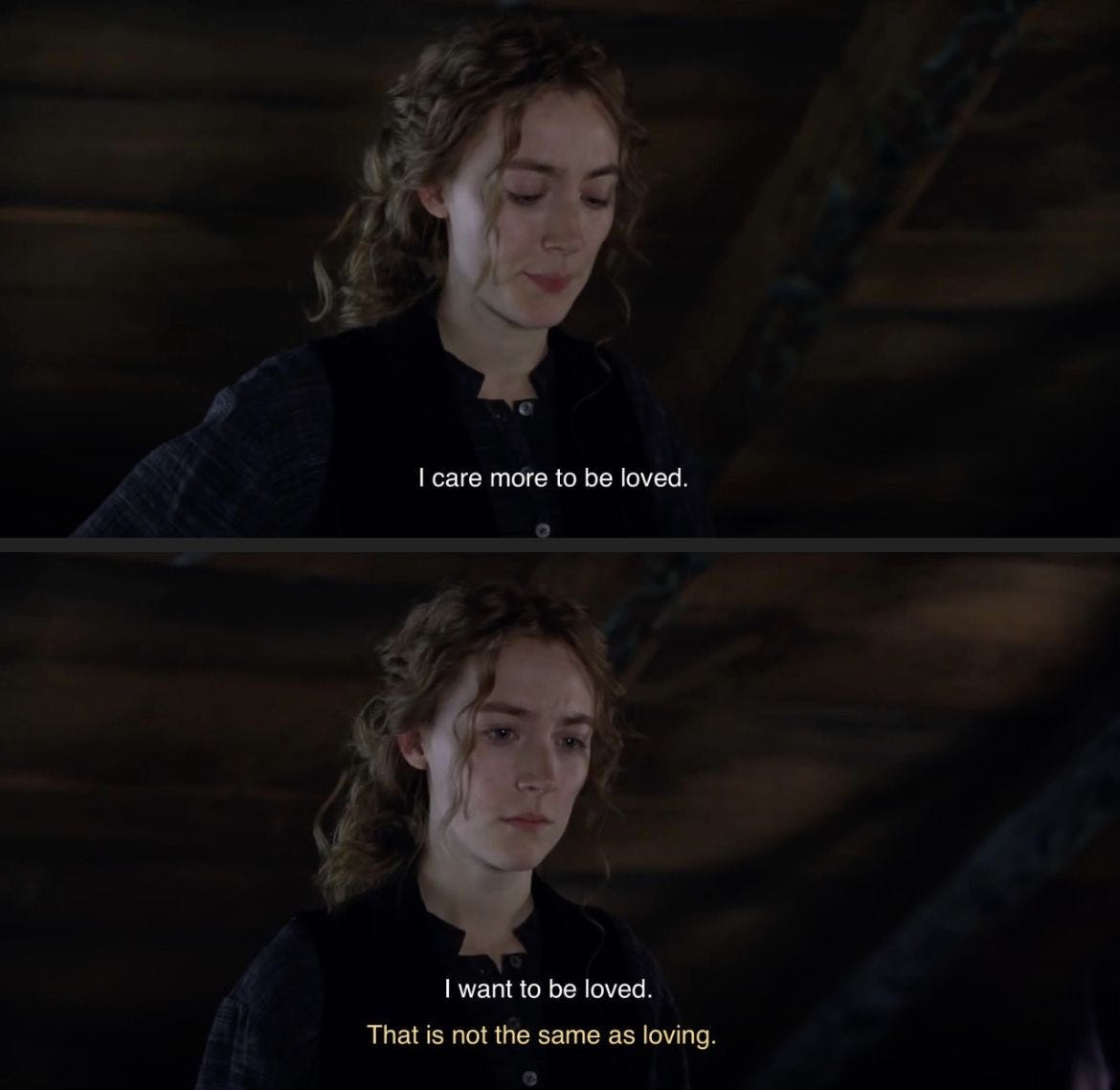In Greta Gerwig’s Little Women, Jo March confesses she desires to be loved more than to love. This moment occurs when her mother, Marmee, gently asks whether Jo loves Laurie, to which Jo responds, “I care more to be loved. I want to be loved.”
Her mother simply replies: “That is not the same as loving.”
In an effort to make sense of herself, Jo continues: “Women have minds and souls as well as hearts, ambition and talent as well as beauty, and I’m sick of being told that love is all a woman is fit for. But…I am so lonely.” This monologue, often quoted as an ode to feminism, is about the aching weight of loneliness and the human desire to be loved.
For a long time, “lonely” has felt like a dirty word to me. To admit I’m lonely aloud felt like conjuring it into existence, as if ignoring it would cause it to disappear. Jo, a character who always insisted she doesn’t need love or marriage, becomes undone by loneliness. Admitting that she’s lonely is like admitting defeat. After all, she’s known as the strong one. The one who says “no” to marriage proposals. The one who has never been defined by a man, but by her writing and dreams. Jo’s monologue in Little Women shows that even the strongest women crack under the weight of isolation.
I used to believe that If I admit I want to be loved, I have failed at being independent. I had always believed that I had to choose between strong or soft. I thought that if I admitted I wanted to be loved, I would be giving away the power that I worked so hard to hold. Being loved requires being chosen and forces me to relinquish my control, leaving behind nail marks from holding onto it so tightly.
When I love, it is all-consuming. It becomes all I know, swallowing me whole. Every part of my body knows it is in love—the way my shoulders relax at the sound of their voice, the vibrant shade of pink my cheeks flush to at the slightest touch, the higher octave my voice raises to when we speak. I love without caution, and when it’s over, it lingers—in my writing, in late Sunday nights. I become haunted by the version of myself who once felt bliss. Suddenly, the love letters turn into obituaries of what once was.
I often think about the funeral of the girl I used to be—the one who would leave her friends early to call the boy she liked. I feel bad for her, pity her, and miss her all at the same time. She longed to be loved so badly that, night after night, call after call, she kept trying to earn it. It’s as if love was something she could deserve if she worked hard enough. Because that’s how it always works. If we prove we are worthy, we will get what we long for. Here lies the girl who tried to be loved and failed, the epigraph would read.
When someone tells you they love you, you also learn that they can take it back. Love becomes borrowed. They choose when to return your worn heart. Growing comfortable with having someone every day is just as much of a gift as it is a curse. There is no fear louder than realizing you can’t picture your life before them. Now, you can’t return to it if you had to. That version of you who had once been untouched by love no longer exists, and you couldn’t ever be her again if you tried.
As someone who has tried so hard to be known as the independent one—the accomplished, the strong—it can feel shameful to admit I long to be wanted. We convince ourselves that being good at loving, in whatever form it may take, should be enough, but is it?
Those who love, wholly and purely, do it because of the belief that it will find its way back to us. But there’s always a part of us that wonders: what will happen if it doesn’t? What if love loses its way to us? Sometimes, we bend ourselves into new shapes, pouring every part of ourselves into someone else to fill them up, rewriting our personalities to better match the version of ourselves we think they’ll stay for. Still, it might not be enough. They can leave or stay halfway, giving just enough hope to keep pouring, bending, and rewriting. In these times, we wonder if we should’ve loved less just to be easier to keep.
So many of us who have moved through the world with wit, ambition, drive, and emotional depth have been told that we’re “too much” or “too complicated.” Jo is all of that. In her loneliness, she admits that no matter how much we achieve, how many nights we sleep soundly alone, or how tall we stand, we still long to be someone’s person.
We want to be chosen, not because we need it to survive, but because we’re tired of surviving alone.
If you’d like to support me and my writing, you can consider buying me a coffee :)






Learning that my “too much” will be “just right “ will be so divine when the time comes. I, too, have sometimes wished I would have “loved less” to stay in a relationship but that wouldn’t have been my true nature. Who I am is who I am and I won’t change that for anyone because someone out there is praying for exactly the person I am becoming each and every day. Thank you for sharing this writing, it truly resonated with me this evening.
“When I love, it is all-consuming.” This is so so so relatable oml